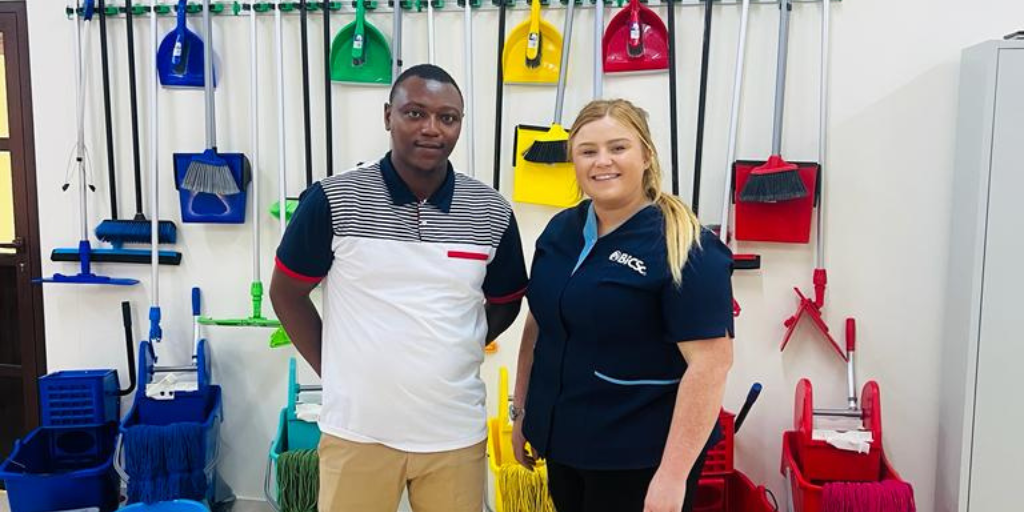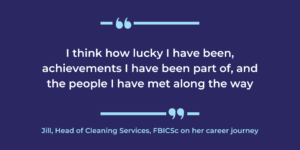Training Officer - Cleaning Careers
If you are interested in making a difference in people’s lives why not become a training officer?
Each time you train a colleague/employee a new skill you are helping contribute to their future whether this be something they use within their current job role or progress further. If you are the kind of person who loves to see people thrive and better themselves, then this could be the job for you.
Training Officer careers: What's involved
How much money can you earn as a Training Officer?
These LMI Job Trends give you a sneak peek of how much you could earn starting out for this career, and how much your salary could grow with experience.
Salary guide for Training Officer jobs
According to a recent survey the starting salary for a training officer £25,000 (per annum) and can earn as much as £35,612 (per annum) working at the average salary for this job role as £28,400 (per annum).
Now many things can affect how much you earn, the biggest being the company you work for, if you are working for a big company, they will not have the same limitations as say a smaller company will have, if you find yourself working for a smaller company there is every possibility that your role be combined with personnel or HR responsibilities. If you are working full-time or part-time, the above numbers are based off full-time employment. The amount of experience you have within this role is going to play a part and where you are living.
Skills you need to become a Training Officer
Useful skills to put in your CV:
There are quite a few different skills you will need in your role as a training officer, a lot of them focussing on interpersonal skills:
Communication skills: Is the ability to convey or share feelings/ideas effectively without any misinterpretation, misunderstandings, or misleading people.
Public speaking skills: When training others it is important that you are able to capture and maintain your audience attention so that you can clearly communicate your message/ideas.
Flexible: Being able to adapt to a changing environment or situation.
Customer service skills: Demonstrating patience and understanding whilst being able to solve problems and show initiative in order to keep a customer satisfied, especially if they have a complaint.
IT skills: Within the role you may be asked to use several devises i.e., a tablet, phone, computer, laptop and their operating systems and software. It is about being able to operate these comfortably.
Problem-solving: Being able to recognise and identify a problem either before it occurs or being able to implement the best solutions afterwards.
Teamwork: Be able to work well within a team and work together to achieve the same goal.
Organisation: Be able to manage your time effectively, set goals and prioritise tasks o you are able to achieve set goals.
Motivation: Have the ability to encourage and inspire colleagues and employees.
Presenting skills: Be able to create and deliver training material effectively.
Time keeping: Be able to use your own time efficiently and wisely, so you can be the most productive.
Top Skills-boosting Tips
Do some personal research into how the cleaning industry puts a big focus on safety, health and the environment. They are all really important in the world of cleaning!
How Do You Get These Skills?
Vocational qualifications and work experience will help you build these skills over time.
What Qualifications & Training Do You Need For Training Officer Careers?
Qualifications and training
When trying to plan for a job with learning and development there is not a set qualification you can do, it is more about studying the qualifications that will help you along the way.
University: The entry requirements for a foundation degree or higher national diploma is 1 or 2 A levels or equivalent. 2 to 3 A levels, or equivalent, for a degree. It would be beneficial to do your studies in either business studies, human resources management, communications, or psychology.
College: There are a few different options you can also take at college focussing on some of the skills you will need for the role. Entry requirements for these courses vary.
Level 3 Certificate in Learning and Development
Level 3 Award in Facilitating Learning and Development
Level 4 Diploma in Learning and Development
https://nationalcareers.service.gov.uk/find-a-course
Apprenticeships: Learning and Development Practitioner Level 3 Advanced apprenticeship would be a beneficial course as it will focus on some of the skills you need and supply you with experience of the job role. As the apprenticeship is an advanced one you will need 5 GCSEs grades 9 to 4 (A* to C) or equivalent, this includes maths and English, the course takes 1 year and 6 months to complete.
To help you on your journey the Chartered Institute of Personnel and Development (CIPD) offer courses in learning and development that will be helpful when applying for job. Qualifications like this may be possible to complete whilst in employment and if seen as part of a development plan the company you work for may fund this.
Who can help?
Many professional bodies also offer a range of training opportunities, including activities that count towards continuing professional development (CPD). Find out more below:
The British Institute of Cleaning Science (BICSc)
BICSc is the largest independent, professional, and educational body within the cleaning industry providing training and education, setting standards and procedures for cleaning. BICSc membership now stands at over 55,000 individual and corporate members in the UK and Internationally.
The Institute of Workplace and Facilities Management (IWFM)
The Institute of Workplace and Facilities Management (IWFM) is the body for workplace and facilities professionals. IWFM empower and enable workplace and facilities professionals to expand their potential and have rewarding, impactful careers. The IWFM was established in 2018. It builds on the proud heritage of 25 years of the British Institute of Facilities Management.
What Work Experience Do You Need For Training Officer Jobs?
Work experience is something that will always be beneficial to you, it will give you an insight into the work you will be doing and the atmosphere you will be working in. It would be quite beneficial if you can gain some work experience within learning and development however, if this is not possible experience within any office atmosphere will also help and set you apart from other people.
Different pathways you can explore for work experience you could volunteer your time and ask if you it would be possible to shadow somebody within the L&D team, see if there is a summer placement or an internship. For more help and guidance follow the link below.
https://www.prospects.ac.uk/jobs-and-work-experience/work-experience-and-internships
Another option you could explore, if you are at university or even college gain some experience in activities that require leadership and being within a role where you have to motivate and teach others, could there be an opportunity where you can mentor somebody or the option to join a club or a society where you can develop your interpersonal skills further. To be able to do this role you have to be understanding and on some occasions sensitive, everyone learns differently and at difference paces and it is finding that balance in order to succeed in this role, which is why this would also be classed as experience.
What Does A Training Officer Do?
What can you be expected to do in your role? These are some of the responsibilities that are expected from you as training officer.
In all parts of the industry you can expect to:
- Create individual training plans.
- Monitor and review progress.
- Write reports.
- Identify areas for employee growth.
- Offer guidance and advice to employees.
- Identify training and development needs within the company.
- Create and deliver learning material.
- Create and deliver induction programmes.
- Ensure statutory training requirements are met.
How To Find Training Officer Jobs: Next Steps
One of the beneficial things about entering a job within the learning and development department is that there is always going to be a need to for training people, which means that there are plenty of job opportunities across several sectors whether it be private or public:
- Charities
- Educational institutes
- Health services
- Leisure organisations
- Hospitality
- Retail
Below is a list of websites that focus on job vacancies within L&D.
PMJobs – https://pmjobs.cipd.co.uk/jobs/learning-and-development/
Personnel Today Jobs – https://jobs.personneltoday.com/jobs/learning-and-development/
Simply HR Jobs – https://www.simplyhrjobs.co.uk/en-GB/jobs/education
You can also apply directly through other job search engines:
- Indeed
- CV Library
- Totaljobs
- Reed
- Glassdoor
The easiest route into this job is on the job training and there is plenty of progression if you feel like you want to progress from an officer. You can become an advisor, coordinator or even a manager.
The Chartered Institute of Personnel and Development also offer memberships which will help further your career through different opportunities where you can network with other people within this growing industry.
https://www.cipd.org/uk/membership/why-choose-cipd-membership/
You can also take a look at our database of local opportunities to see if there are any relevant jobs, work placements, or careers events and workshops to help you get started.
Get Into Cleaning Careers With Caring Employers
These employers and organisations are here to help. They care about your potential and desire to learn, not just your qualifications and experience. They may be able to offer traineeships, apprenticeships, graduate schemes, first jobs, careers advice, wellbeing support and much more.
Cleaning and Facility Management Career Tips & Opportunities
Careers in Cleaning - Your Stories
Cleaning and Facility Management Career Guides
View job descriptions with average UK salary, useful qualifications and a variety of routes into this career.
See All Our Caring Employers






































































YES! I Want More Free Careers Help...
So what are you waiting for? Grab your future.













































